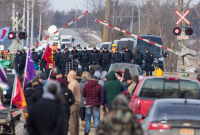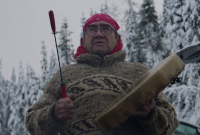Support strong Canadian climate journalism for 2025
Canada has long struggled to reconcile its tortured relationship with those who were here first. It will need to think differently to address the latest version of Indigenous resistance, historians and Indigenous scholars say.
For the past three weeks, Indigenous-led demonstrations have blocked rail lines across the country in solidarity with Wet’suwet’en pipeline opponents in British Columbia.
And for three weeks, authorities have played a cat-and-mouse game in response, pursuing blockaders with court injunctions and arrests as more demonstrations flared up across the country.
The first sign that the impasse could be resolved emerged Thursday, when key demands of the Wet’suwet’en hereditary chiefs were met and the chiefs agreed to meet with provincial and federal officials.
But a long history of similar conflicts between settlers and Indigenous people in Canada suggests tumult will likely persist until the country reckons with its colonial legacy, said Lee Maracle, a member of Sto:Loh Nation in B.C. and an Indigenous studies instructor at the University of Toronto.
“This is going to go on and on,” she said. “We have been asking for this conversation (on Indigenous rights) ever since the beginning of Canada.”
Solidarity demonstrations erupted across the country earlier this month after the RCMP raided Wet’suwet’en camps on the nation’s traditional northern B.C. territory. Organizers have said they won’t stop until the Wet’suwet’en hereditary chiefs’ demands — to have the RCMP and Coastal GasLink off their land — are met.
On Thursday, Coastal GasLink agreed to pause pre-construction work on Wet’suwet’en territory for two days to allow for talks, and the RCMP have agreed to stop patrols and pull out of a mobile detachment nearby. The hereditary chiefs met with federal Crown-Indigenous Relations Minister Carolyn Bennett on Thursday, with plans to meet with her B.C. counterpart, Scott Fraser, on Friday.
In the longer run, however, a reconciliation between the two sides seems more difficult: the Wet’suwet’en hereditary chiefs’ want a permanent halt to the pipeline, but the B.C. government has been unwilling to stop the project. And the federal government would like the solidarity blockades to end, something the hereditary chiefs have said they won’t ask other nations to do.
Though sparked by Coastal GasLink, the Wet’suwet’en solidarity movement has also tapped into an older anger that can be traced back to the founding of the Canadian state.
‘We've seen conflict after conflict transpire in a very predictable way’
Nearly every aspect of life as an Indigenous person in the country is regulated by either the colonial Indian Act or a piece of Canadian law that followed, a profoundly frustrating way to live, said Tara Williamson, an Anishinaabe/Nehayo scholar and research fellow with the Yellowhead Institute, a think-tank focused on Indigenous self-determination.
“It is so difficult to live as an Indigenous person in Canada,” she said. “It’s not a moment, it’s been a movement built upon lots of frustration.”
There are fundamental truths at play.
Canada’s foundation and continued existence relies on land stolen from Indigenous peoples. It relies on broken treaties that were supposed to create a nation-to-nation relationship and on the occupation of unceded territories where no agreement even exists. And it relies on the trauma inflicted by those processes, then and now.
People living on scores of First Nations reserves continue to live under boil-water advisories, despite election promises from Prime Minister Justin Trudeau. Youth suicides are a longstanding crisis in Indigenous communities, as are higher levels of poverty and violence.
Sean Carleton, an assistant professor at Mount Royal University who studies the history of Indigenous-settler relations, said the battle between the Wet’suwet’en and the backers and supporters ofCoastal GasLink is a repetition of an old pattern. It usually goes something like this, he said: Canada wants something. Indigenous people want to negotiate. Canada doesn’t like it and uses force to get its way.
If political leaders don’t want the same processes to play out again and again, they need to try something different and form real nation-to-nation relationships, he said.
“We've seen conflict after conflict transpire in a very predictable way,” he said. “Learn from it so that we don't have to do this again.”
These truths must be recognized before Canada can truly move forward in reconciliation, Williamson said.
“I appreciate that it must be really difficult for the average Canadian to learn the truth about what’s happened,” she said.
“But nothing will change if they don’t.”






Comments
Finally, an article that addresses problems that exist with our Canadian Government's, of all stripes both Federal and Provincial. The words of Justin Trudeau in 2015 after election showed promise of action. Some action has been taken ie: Reconciliation Committee on missing indigenous women, a report submitted and from a citizens view it has died a natural death due to government in action. Let me be clear "it is inaction by all Parties, Conservative, Liberal, New Democratic and Green at Federal and Provincial levels".
A bright spot does exist in British Columbia where successful agreements have been worked out with Indigenous bands in southern BC that have proven successful and they pay taxes and function quite well from all reports that I have read.
A example of what can be accomplished by the Indigenous people can be found on the internet under "Okanagan Nation Alliance".
It's time all parties work at making things better, quit talking and start doing as the saying goes.
I have a very easy solution to this huge conflict, for now anyway. I am a total supporter of the Wets’uwet’en chiefs but now that there is a meeting in BC, the blockages and protests must stop. The RCMP have left, Coastal gas has stopped for now and there is a meeting, now is the time for everyone to STAND DOWN. Don’t wait till the police force you to leave, then they win, do it now in support of those demands. The rail blockages, the kids at the government buildings and the roadways must be cleared to see if this meeting can solve anything. Protests can always return but if the Wet’suwet’en chiefs want support they must call, today Friday, for things to stop while this meeting is taking place. As a teacher and parent that’s how you solve conflicts and stop wars....it’s fairly simple. Everyone needs to take a deep breath!! No one pays me a thing for this simple advice! Cheerio from Salt Spring Island.
Everyone should listen to this talented reporter on this week's Canadaland podcast. Her coverage of this difficult saga, her confrontation with the living reality of the cruel hypocrisy of colonial raw power, is obviously taking a personal toll on her, just as it is on lots of ordinary people who find themselves inextricably caught in an ongoing true story of victor and vanquished, possessor and dispossessed, powerful and dis-empowered. The Wet'suwet'en and their supporters know full well that power rarely if ever surrenders conquered ground on the basis of any sort of moral argument; that power only responds to resistance, and only then when resistance is strong enough, which means when expressed as popular movements, with solidarity developed across disparate groups. This is the growing fact of the matter.
The corporation and their cronies in government that propound the pipeline project at issue, constrained by the power of great wealth jealously hoarded into few grasping hands, from considering mere "externalities" e.g. indigenous rights, the common good, future generations of bears, caribou, people, the atmosphere, the biosphere, etc. Instead it must only consider the conventional budget, balance sheet, statement of profit and loss, etc., always the least enlightening and most deceptive of literary forms. That these narrow interests somehow correspond in any general sense, as put forward with the four letter, three word spurious argument "jobs, jobs, jobs..." is by now so transparently hollow, especially to growing legions of people of Ms. McIntosh's generation who must scrounge for "gigs, gigs, gigs...", that it is almost reflexively dismissed, and rightly so.